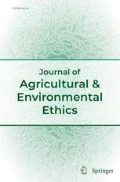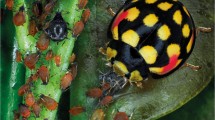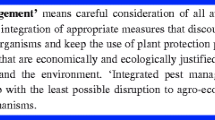Abstract
The increasing demand for horticultural products for nutritional and economic purposes by lesser developed countries (LDC's) is well-documented. Technological demands of the LDC's producing horticultural products is also increasing. Pesticide use is an integral component of most agricultural production, yet chemicals are often supplied without supplemental information vital for their safe and efficient implementation. Illiteracy rates in developing countries are high, making pesticide education even more challenging. For women, who perform a significant share of agricultural tasks, illiteracy rates are even higher than for men. The dilemma exists of how a developing country can improve its nutritional and economic situation without giving consideration to social and environmental consequences.
Similar content being viewed by others
References
Boardman, Robert. 1986.Pesticides in world agriculture. New York: St. Martin's Press.
Brady, Nyle C. 1983. Human, political, and institutional considerations in international agricultural development.HortSci. 18(3): 291–293.
Cummings, Ralph W. 1983. Scientific and technological opportunities in agricultural development in less-developed countries.HortSci. 18(3): 296–299.
Dixon-Mueller, Ruth. 1985.Women's Work in Third World Agriculture: concepts and indicators. Geneva: International Labour Office.
Eisa, Hamdy M. 1986. A horticulturist's view of international agricultural strategies.HortSci. 21(3): 378–381.
Engel, J. Ronald, and Joan Gibb Engel. 1990.Ethics of Environment and Development. Tucson, AZ: The University of Arizona Press.
Findlay, Allan, and Anne Findlay. 1987.Population and development in the third world. New York: Methuen.
Food 2000. 1987.Food 2000: global policies for sustainable agriculture. New Jersey: Zed Books Limited.
Hopper, W. David. 1989. Role of horticulture in the economy of developing nations: A global overview.HortSci. 24(6):900–903.
Kandiyoti, Deniz. 1985.Women in rural production systems: problems and policies. Paris: UNESCO.
Mathews, J.T. 1986.World Resources 1986: A report by The World Resources Institute and The International Institute for Environment and Development, pp. 48–49. New York: Basic Books, Inc.
Mohan, V.C. 1987. The pesticide dilemma in Malaysia. Chapter 9 inManagement of Pests and Pesticides: Farmers' Perceptions and Practices, edited by J. Tait and B. Napompeth. Boulder, CO: Westview Press.
Muir, T., and A. Sudar. 1987. Toxic Chemicals in the Great Lakes Basin Ecosystem-Some Observations. Monograph, Burlington.
Norton, Bryan G. 1987. Why Preserve Natural Variety? Princeton, NJ: Princeton University Press.
Omari, C.K. 1990. Traditional African Land Ethics. InEthics of Environment and Development, edited by Engel and Engel, pp. 167–175. Tucson, AZ: University of Arizona Press.
Oyer, Edwin B. 1986. Integrating international agricultural development activities in land-grant universities and colleges.HortSci. 21(3):375–377.
Palmer, Ingrid. 1985.The impact of agrarian reform on women. West Hartford, CT: Kumarian Press.
Pesek, J. 1989.Alternative Agriculture. Washington, DC: National Academy Press.
Regier, Henry A. et al. 1990. Integrity and surprise in the Great Lakes Basin Ecosystem. InAn Ecosystem Approach to the Integrity of the Great Lakes in Turbulent Times, edited by Clayton J. Edwards and Henry A. Regier, pp. 17–36. Ann Arbor, MI: Great Lakes Commissions.
Repetto, R. 1985.Paying the price: pesticide subsidies in developing countries, Research Report #2. Washington, DC: World Resources Institute.
Rice, R.P., and L.W. Rice. 1988. Status of horticulture in the developing countries of Southern Africa.HortSci. 23: 965–967.
Sagoff, M. 1988.The Economy of the Earth. Cambridge, England: Cambridge University Press.
Salleh, Ariel. 1990. Living with nature: Reciprocity or control? InEthics of Environment and Development, edited by Engel and Engel, pp. 245–253. Tucson, AZ: University of Arizona Press.
Satin, Mark. 1990. Small, organic farms can solve the farm crisis.Trumpeter 7: 88–90.
Shiva, Vandana. 1988.Staying Alive: women, ecology, and development. Atlantic Highlands, NJ.
Shrader-Frechette, K. 1983.Nuclear Power and Public Policy: the social and ethical problems of fission technology. Boston, MA: Kluwer.
—. 1991.Risk and Rationality (chaps. 11 and 12). Berkeley, CA: University of California Press.
Steen, D., and P. Kretchmer. 1986. Agriculture and rural development strategy.HortSci. 21: 381–384.
Stino, George Ramzy. 1987. Is growing temperate-zone fruits profitable in the tropics and subtropics?HortSci. 22(6): 1243–1246.
Taylor, Paul. 1986.Respect for Nature: a theory of environmental ethics. Princeton, NJ: Princeton University Press.
Thomas-Lycklama a Nihejolt, G. 1980. The household, a woman's cage? A policy perspective. InThe Household, Women and Agricultural Development, edited by C. Presvelou and S. Spijkers-Zwart, pp. 75–82. Wageningen, The Netherlands.
United Nations ESCO. 1989. Statistical Yearbook (Unesco). Paris, France.
United Nations, Food and Agricultural Organization. 1984. FAO Trade Yearbook. FAO Series #63, Vol. 38, Table 131, pp. 304–306.
United States International Trade Commission. 1982. Supplement to Summary of Trade and Tariff Information: Synthetic Organic Pesticides, TSUS Items 408.16-408.38. USITC publication #841. December.
Velasquez, Manuel G. 1988. Business Ethics, Concepts and Causes. Englewood Cliffs, NJ: Prentice-Hall, Inc.
Westra, L. 1989a. Normative statement as part of recommendations inToxic Chemicals in Great Lakes Ecosystems. Buffalo, NY: Great Lakes Institute, SUNY.
—. 1989b.Respect, Dignity and Integrity: An Environmental Proposal for Ethics. Geneva: Epistemologia.
Women in Plant Pathology. 1987. Women in Plant Pathology Survey: Part I.Phytopathology News 21: 83.
Author information
Authors and Affiliations
Rights and permissions
About this article
Cite this article
Westra, L.S., Bowen, K.L. & Behe, B.K. Agricultural practices, ecology, and ethics in the third world. J Agric Environ Ethics 4, 60–77 (1991). https://doi.org/10.1007/BF02229147
Issue Date:
DOI: https://doi.org/10.1007/BF02229147




